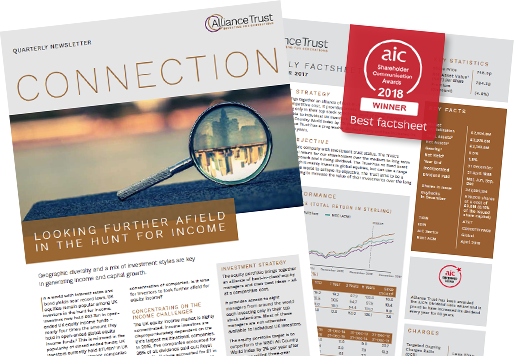The importance of strong culture in investment organisations
Responsible investing has become the buzzword of asset management
in recent years, with a swathe of new processes and benchmarks introduced
in efforts to improve investor decision-making.
However, one aspect that is often overlooked, is an examination of a company’s culture. It is something that goes hand in hand with responsible investing, yet is only now beginning to appear on the radar of investors, whether that be when selecting an asset manager or deciding to invest in a company’s stock.
Gaining an investment edge
While hard strategy and direction are important, a company’s culture will reveal a lot about how a business is run, about the dedication of employees, and about the management style of senior leaders.
Willis Towers Watson, the investment manager of the Alliance Trust PLC portfolio, defines culture as “the collective influence of shared values and beliefs on the way an organisation thinks and behaves”, and considers it a key element to an asset manager’s success. An assessment of culture is an important component that we incorporate into our decision-making, when selecting managers to pick stocks for the Alliance Trust global equity portfolio.
A manager’s ethical orientation and integrity can serve as the ultimate safeguard against fraud and reputational damage, particularly in a world of increasing regulatory scrutiny. Actions speak much louder than words in ensuring a positive, dynamic backdrop in a workplace. Simply aiming to be inclusive and future-focused, does not necessarily mean that this is reflected on the ground. When examining culture, we must also make a consideration for context.
There is no blueprint for how a culture ‘should’ be, so we must be able to strike a balance between comparing firms, while being flexible enough to account for nuances between different teams.
Examining how a company delivers value to employees and clients, as well as how the overarching leadership provides guidance and oversight of culture, is a good starting point. If management leads with integrity and fairness, while balancing hiring the best talent with incorporating diversity, then it hints at a positive underlying culture. If an individual portfolio manager owns shares in their own strategies, and owns or has strong influence over the asset management business, it’s generally a good sign. It means their interests can be aligned with the clients, and that’s one of the tests we apply before selecting them to invest the Trust’s assets.
Clearly, there will be many examples of weak culture that suggest limited prospects for a firm. Issues such as a lack of development opportunities for junior staff, can be a big red flag when looking into a business. If staff don’t appear to be engaged or connected with the firm’s mission, or if there is ‘groupthink’ and little diversity in thought, this can also raise concerns. Other red flags might include closely held ownership, or a firm that places little value on levels of client satisfaction.
Is it worth the time?
Making ‘culture’ an integral part of the investment process can be timeconsuming. It can be hard to quantify or measure, as it is associated with ‘soft’ data rather than hard figures, not to mention being difficult to define. However, it is possible, and more companies are seeing the benefit of doing so.
Short-term thinking can prevent some investors from viewing culture as an important indicator; often this is due to the length of time it can take for a positive culture to translate into tangible financial returns. Yet we believe culture can provide a clear
and sustainable edge when it comes to investing.
“ If management leads with integrity and fairness, while balancing hiring the best talent with incorporating diversity, then it hints at a positive underlying culture.”






